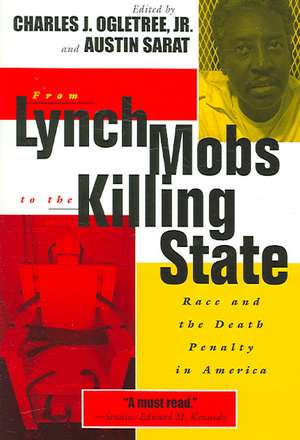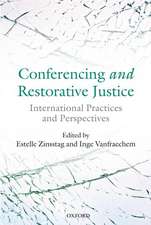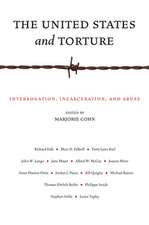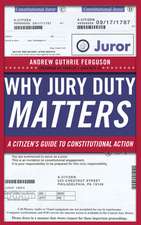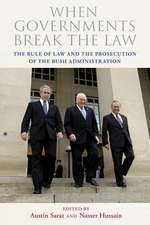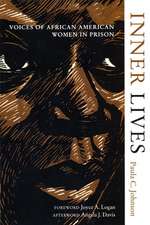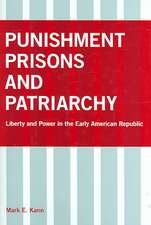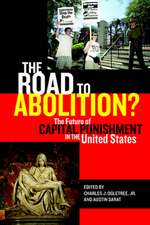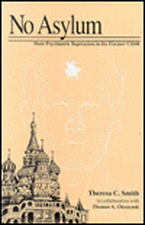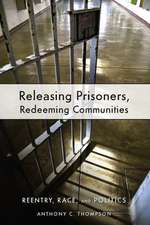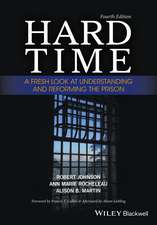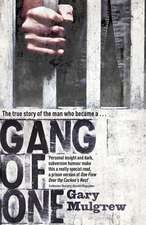From Lynch Mobs to the Killing State – Race and the Death Penalty in America: The Charles Hamilton Houston Institute Series on Race and Justice
Autor Charles J. Ogletree Jr., Austin Saraten Limba Engleză Paperback – 30 apr 2006
| Toate formatele și edițiile | Preț | Express |
|---|---|---|
| Paperback (1) | 242.60 lei 6-8 săpt. | |
| MI – New York University – 30 apr 2006 | 242.60 lei 6-8 săpt. | |
| Hardback (1) | 527.18 lei 6-8 săpt. | |
| MI – New York University – 30 apr 2006 | 527.18 lei 6-8 săpt. |
Preț: 242.60 lei
Nou
Puncte Express: 364
Preț estimativ în valută:
46.43€ • 50.41$ • 38.100£
46.43€ • 50.41$ • 38.100£
Carte tipărită la comandă
Livrare economică 23 aprilie-07 mai
Preluare comenzi: 021 569.72.76
Specificații
ISBN-13: 9780814740224
ISBN-10: 0814740227
Pagini: 320
Dimensiuni: 152 x 228 x 24 mm
Greutate: 0.43 kg
Editura: MI – New York University
Seria The Charles Hamilton Houston Institute Series on Race and Justice
ISBN-10: 0814740227
Pagini: 320
Dimensiuni: 152 x 228 x 24 mm
Greutate: 0.43 kg
Editura: MI – New York University
Seria The Charles Hamilton Houston Institute Series on Race and Justice
Recenzii
"Expertly dissects the racist underpinnings of capital punishment while pushing some intellectual boundaries.
International Socialist Review"The authors give the nation an unflinching view of the shameful influence of racism in death penalty cases. This is a must read for anyone who cares about fairness in application of the death penalty and respect for the rule of law in our modern society.
Senator Edward M. Kennedy "Ogeltree and Sarat combine the most severe criminal punishment with the bugaboo of racial class and prejudice in their book From Lynch Mobs to the Killing State. The professors astutely note that the death penalty is often used as a club to keep poor and desperate minorities in line in the larger white society.
Black Issues Book Review "Professors Charles Ogletree and Austin Sarat gather an impressive lineup between racial politics in America and the killing of African-Americans.Harvard Law Review"An elegant compendium of essays written by sociologists, historians, criminologists, and lawyers. The essays starkly reveal how this countrys death penalty has its roots in lynchings, and how it operates to sustain a racist agenda.
The Federal Lawyer"This book offers thoughtful and wide-ranging assessments of how America's most dramatic punishment intersects with America's deepest and most divisive social problem. These essays go far beyond the obvious and offer much of interest both for those with a particular interest in the death penalty and for those who seek to understand and to ameliorate our country's shameful legacy of racial inequality. This is the rare book that will be helpful to the student, the scholar, and the activist alike."
Carol Steiker, Harvard Law School "Essential reading for all who are seeking to understand the contemporary American death penalty or to imagine an America without one."
Jonathan Simon, School of Law-Boalt Hall, University of California, Berkeley "A major contribution."
Randy A. Hertz, NYU School of Law "Riveting and very timely. Remarkably, the book creatively assembles social history, demographic and statistical analysis, experimental psychology, and legal history and finds a common truth: the death penalty may be one of the most persistent, self-reinforcing ways we uphold racial division."
Robert Weisberg, Stanford University Law School "The book is bound to influence the thinking of many who tolerate if not actively support the death penalty because of the way it shows how deeply entrenched are the shameful racist attitudes and practices in our nation's dominant (white) culture."
Hugo Adam Bedau, editor of The Death Penalty in America "This is the first recent volume to address race and capital punishment in such a broad, systematic, andperhaps most importantlymulti-disciplinary fashion."
David R. Dow, University of Houston Law Center
International Socialist Review"The authors give the nation an unflinching view of the shameful influence of racism in death penalty cases. This is a must read for anyone who cares about fairness in application of the death penalty and respect for the rule of law in our modern society.
Senator Edward M. Kennedy "Ogeltree and Sarat combine the most severe criminal punishment with the bugaboo of racial class and prejudice in their book From Lynch Mobs to the Killing State. The professors astutely note that the death penalty is often used as a club to keep poor and desperate minorities in line in the larger white society.
Black Issues Book Review "Professors Charles Ogletree and Austin Sarat gather an impressive lineup between racial politics in America and the killing of African-Americans.Harvard Law Review"An elegant compendium of essays written by sociologists, historians, criminologists, and lawyers. The essays starkly reveal how this countrys death penalty has its roots in lynchings, and how it operates to sustain a racist agenda.
The Federal Lawyer"This book offers thoughtful and wide-ranging assessments of how America's most dramatic punishment intersects with America's deepest and most divisive social problem. These essays go far beyond the obvious and offer much of interest both for those with a particular interest in the death penalty and for those who seek to understand and to ameliorate our country's shameful legacy of racial inequality. This is the rare book that will be helpful to the student, the scholar, and the activist alike."
Carol Steiker, Harvard Law School "Essential reading for all who are seeking to understand the contemporary American death penalty or to imagine an America without one."
Jonathan Simon, School of Law-Boalt Hall, University of California, Berkeley "A major contribution."
Randy A. Hertz, NYU School of Law "Riveting and very timely. Remarkably, the book creatively assembles social history, demographic and statistical analysis, experimental psychology, and legal history and finds a common truth: the death penalty may be one of the most persistent, self-reinforcing ways we uphold racial division."
Robert Weisberg, Stanford University Law School "The book is bound to influence the thinking of many who tolerate if not actively support the death penalty because of the way it shows how deeply entrenched are the shameful racist attitudes and practices in our nation's dominant (white) culture."
Hugo Adam Bedau, editor of The Death Penalty in America "This is the first recent volume to address race and capital punishment in such a broad, systematic, andperhaps most importantlymulti-disciplinary fashion."
David R. Dow, University of Houston Law Center
